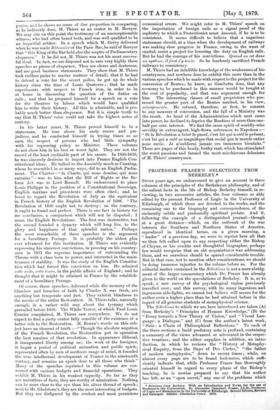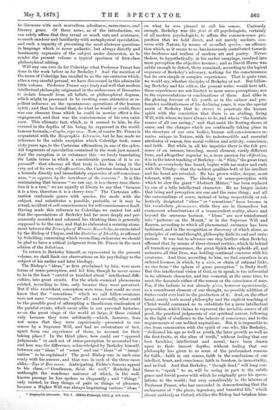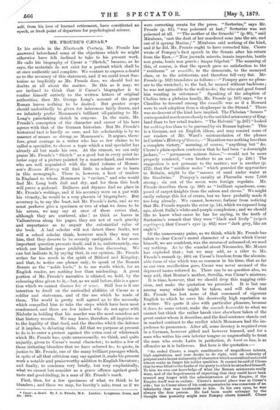PROFESSOR FRASER'S SELECTIONS FROM BERKELEY.*
SEVEN years ago, we endeavoured to give an account in these columns of the principles of the Berkeleyan philosophy, and of the salient facts in the life of Bishop Berkeley himself, in re- viewing, in two successive articles, the four volumes so ably edited by the present Professor of Logic in the University of Edinburgh, of which three are devoted to the works, and the remaining one to the biography and correspondence, of the eminently subtle and profoundly spiritual prelate. And if, following the example of a distinguished journal—though at a great distance—which, on the outbreak of the war between the Southern and Northern States of America, reproduced in identical terms, on a given morning, a " leader" of a previous day, we were to reprint here all that we then felt called upon to say respecting either the Bishop of Cloyne, or his erudite and thoughtful biographer, perhaps few would recognise that an old acquaintance was addressing them, and we ourselves should be spared considerable trouble. But in that case, not to mention other considerations, we should be doing immense injustice to the volume before us. For the editorial matter contained in the Selections is not a mere abridg- ment of the larger commentary which Dr. Fraser has already given to the world on the speculations of Berkeley: It is, so to speak, a new survey of the psychological region previously travelled over ; and this survey, with its many ingenious and ingenuous side-lights, we cannot but believe will secure for the author even a higher place than he had attained before in the regard of all genuine students of metaphysical science.
The Selections to which we are here introduced are taken (A) from Berkeley's " Principles of Human Knowledge," (B) the " Essay towards a New Theory of Vision," and " Visual Lan, guage : a Dialogue," and (C) from the author's latest work, " Sins : a Chain of Philosophical Reflections." To each of the three sections a lucid prefatory note is prefixed, containing a summary of the views advanced or advocated in the respec- tive treatises ; and the editor supplies, in addition, an intro- duction, in which he reviews the " History of Metaphy- sical Enquiry, from the Days of Des Cartes," "the father of modern metaphysics," down to recent times ; while, on almost every page are to be found foot-notes, which suffi- ciently indicate that, while Professor Fraser has thoroughly oriented himself in regard to every phase of the Bishop's teaching, he is nowise prepared to say that his author has left, as an " open secret," any one of the problems which
• Selections from Berkeley. With an Introduction and' Notes. for the use of Students in the Universities. By Alexander Campbell Fraser, LL.D., Professor of Logic and Metaphysics in the University of Edinburgh. Second Edition,Bettleed and Enlarged. Oxford : Clarendon Press. DIM
he discusses with such marvellous adroitness, earnestness, and literary grace. Of these notes, as of the introduction, we can safely affirm that they reveal so much care and acuteness, so much candour and familiarity with metaphysical speculation, and such a capacity of presenting the most abstruse questions in language which is never pedantic, but always directly and luminously expressive of the subject under discussion, as to render the present volume a typical specimen of first-class philosophical editing.
Will any one ever do for Coleridge what Professor Fraser has done in the work before us for Berkeley ? And the mention of the name of Coleridge has recalled to us the one omission which, after a very careful perusal, we have discovered in this admirable little volume. Professor Fraser says truly and well that modern intellectual philosophy originated in the endeavours of Descartes to isolate himself from all beliefs, or philosophical dogmas, which might be presumed to be exerting some attractive or re- pellent influence on the spontaneous operations of the human spirit ; and that he found that, do what he would or could, there was one element from which he could in nowise effect a dis- engagement, and that was the consciousness of his own exist- ence. This ultimate fact, which, as it seemed to him, he dis- covered in the depths of his being, he expressed in the world- famous formula,—Cogito, ergo sum. Now, of course Dr. Fraser is acquainted with the Biographia Literaria, but he has made no reference to the subtle exception which Coleridge took, some sixty years ago, to the Cartesian affirmation, in one of the splen- did fragments of speculation contained in the work just named. And the exception is in substance this—we freely translating the Latin terms in which a considerable portion of it is ex- pr essed*—that whereas all that truly is, has its being in the very act of its own self-alirm,ation, the Cartesian formula is not a formula directly and immediately expressive of self-conscious- ness, "as appears by the inevidence of the converse." It is like maintaining that because " we can say, it is a cherry-tree, there- fore it is a tree," we are equally at liberty to say that " because it is a tree, therefore it is a cherry-tree." The Cartesian affir- mation confounds genus with species, the mode with the subject, and substitutes a possible, probable, or it may be actual, accident of self-consciousness for self-consciousness itself. Having made this reference to Coleridge, we cannot but add that the speculations of Berkeley had far more deeply and per- manently moulded and coloured his thinking than is generally supposed to be the case, and that he elaborated a seeming atone- ment between the Principles of Human Knowledge, as enunciated by the Bishop of Cloyne, and the Doctrine of Identity, as affirmed by Schelling, concerning which reconciling endeavour we should be glad to have a critical judgment from Dr. Fraser in the next edition of the Selections.
To return to Berkeley himself, as represented in the present volume, we shall limit our observations on his psychology to the subject of his earlier and later ideology.
The Bishop's " ideas," as first proclaimed by him, were mere forms of sense-perception, and led him, though he never seems to be in the least " careful or troubled about " intellectual diffi- culties, into great straits. For the whole cosmical phenomena existed, according to him, only because they were perceived. But if this exorbitant conception were true, how could we ever know that the " sensations " which we call fellow-creatures were not mere "sensations," after all ; and secondly, what could be the possible good of attempting a theodicwan vindication of the painful events, which occur alike in our personal histories, as on the great stage of the world at large, if these existed only because they were arbitrarily—which, however, does not mean that they were capriciously—presented to our senses by a Supreme Will, and had no substratum of fact, apart from our experience of them, to account for their taking place P In the third place, how could our " opposed judgments " in each act of sense-perception be accounted for; and how was the difference, acknowledged by Berkeley himself, between our " ideas " of " sense " and our " ideas " of " imagi- nation" to be explained ? The good Bishop was in each case ready with his answer, and that was in each of the three cases .alike,—Ego et Rav mews. Anticipating Fichte's famous appeal to his class,—" Gentlemen, think the wall," Berkeley had unthought the wondrous universe of which, in the well- known passage he has spoken so eloquently ; and " things " only existed, be they things of pain or things of pleasure, because a Higher Will was always imprinting various " ideas "
• Biographia Literaria.. Vol. I. (Unto PrIncepo, 1817), p. 269, note. on what he was pleased to call his senses. Curiously enough, Berkeley was the first of all psychologists, certainly of all modern psychologists, to affirm the common-sense pro- position that we hold direct, and not merely mediate, con- verse with Nature, by means of so-called species,—an affirma- tion which, as it seems to us, has immensely contributed towards the freshness and realism of modern art and poetry. Never- theless, he hypothetically, in his earlier easayings, resolved into mere perception the objective kosmos ; and as David Hume was subtle enough to detect, there remained, according to the logical sequence of Berkeley's advocacy, nothing for the consciousness but its own simple or complex experiences. That is quite true, we would say, whether disciples of Berkeley or not. But follow- ing Berkeley and his editor, the present writer would here add, these experiences are not limited to mere sense-perceptions, nor to the representations or combinations of them. And alike in the glowing fervour of his youth, as in the calmer and pro- founder meditativeness of his declining years, it was the special merit of Berkeley that he strove to penetrate the human spirit with the conviction that there is an abiding, living Will, with whom we have always to do, and who is " the fountain source of all our seeing ;" and that amid the fleeting shows of sense, and the changes which are continually taking place in the structure of our own bodies, human self-consciousness re- mains unique in Nature, with its indestructible and essential attributes of reason, free moral volition and activity, conscience, and faith. But while in all his inquiries there is the felt pre- sence of an intense, brooding, moral element, vastly different from, and altogether superior to, a mere passion for edification, it is in the latest teaching of Berkeley—in " Siris," the great tract which, as everybody has heard, begins with tar-water and ends with the Trinity—that the noblest qualities both of his intellect and his heart are revealed. He has grown wider, deeper, more tolerant, with years. The ideology of sense-perception with which he slew the giant " Abstract Matter," has been replaced by one of a lofty intellectual character. He no longer insists that being and perception are one and the same thing ; and all the surroundings of sense, instead of being respectively or col- lectively designated " ideas " or " sensations," have become in his vocabulary phenomena, while they are in themselves but evanescent adumbrations of a transcendent reality, above and beyond the sensuous horizon. " Ideas " are now transformed into " patterns on the Mount," or in the Supreme Will and Reason, according to which all phenomenal existence has been fashioned, and in the recognition or discovery of which alone, as principles of rational thought, philosophy finds its end and satis- faction. It was but to advance one step further when Berkeley affirmed that, by means of these eternal verities, which lie behind all transitory appearance, the great Spirit who upholds all, and animates all that lives, was holding continual converse with his creatures. And thus, according to him, we find ourselves in an ordered kosmos, in which, by a tiris, or chain of rational links, we rise from "the sphere of gross perception" to Deity itself. But this intellectual vision of God, so to speak, is too inferential in its ultimate character, and too unmoral, at the same time, to meet the demands either of the reason or the conscience of man. For, if the Infinite be not already given, however mysteriously, as a constituent element of our thought, no possible addition of finites could ever lead to the production of it. And, on the other hand, surely both moral philosophy and the explicit teaching of Christ would command us to substitute for a mere intellectual proposition, which claims to represent the invisible source of all good, the practical judgments of our spiritual nature, following in the light of obedience to the behests of conscience, and to the requirements of our noblest aspirations. But it is impossible to rise from communion with the spirit of one who, like Berkeley, " dedicated his age as well as youth, the later growth as well as the first-fruits, at the altar of truth," without feeling that our best faculties, intellectual and moral, • have been drawn upon to their inmost depths, without feeling that our philosophy has given to us some of the profoundest reasons for faith,—faith in our senses, faith in the conclusions of our intellect, heart, and conscience, faith in freedom, in immortality, and in God. And that Berkeley, " though dead," will long con- tinue to " speak " to us, will be owing in part to the subtle grace and fervid power with which he originally gave his specu- lations to the world ; but very considerably to the labours of Professor Fraser, who has succeeded in demonstrating that the endeavours of " the pious, ingenious, and beautiful life," which closed suddenly at Oxford, whither the Bishop had betaken hint-
self, from his love of learned retirement, have constituted an epoch, or fresh point of departure for psychological science.




































 Previous page
Previous page